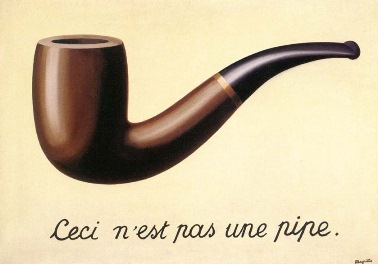"The map is not the territory"
The COVID lockdown era was a bit of a blur for me, but one distinct thing that I can remember is the idea
A map is not the territory it represents, but, if correct, it has a similar structure to the territory, which accounts for its usefulness.
— Alfred Korzybski, in A Non-Aristotelian System and Its Necessity for Rigour in Mathematics and Physics
Allow me to give myself less credit — I did not learn this idea from the quoted paper; instead, I learned this idea over the course of a few months reading tweets from tech-adjacent / post-rat Twitter back in 2020. This completely altered my mind in regard to science and human progress, so below is an explanation of its meaning and implications.
Science, as Taught to Me
Elementary, middle, and high school entailed covering the basic principles underlying the physical and life sciences. I had learned about the connection between parabolas and projectile motion, the different kinds of organelles, and the two chemical equations governing life on Earth (cellular respiration and photosynthesis), amongst other things. My favorite subject in school throughout the years had always been science because I’d thought that science was all about finding the true nature of reality. Ideas like finding a “Theory of Everything” or a cure to a disease without any side effects fascinated me to no end, and sent me down a STEM track in late high school and college.
But is what we’re doing with science truly about finding the true nature of reality, or something else entirely?
The Literal Meaning
Cartographers exist so that we can make sense of the geographical and geopolitical layout of the world. Without mapmakers, we would have no idea how to navigate new places, no idea how to make enough sense of the world to locate the convenience store, or the laundromat, or the best places to hang out with friends in the neighborhood.
Taken literally, “the map is not the territory” implies that any map made will never be able to describe the true nature of the location it is mapping. If you’re on the coast, for example, any drawn boundary will never be able to describe the current position of the grains of sand that define the real boundary. Google Maps will never be able to describe your town in such a high fidelity that you know everything about its environment in real time. Does Google Maps show the $5 bill someone dropped on the sidewalk? Does it show the potholes or construction you should avoid on the way to work?
The Broader Meaning

In its essence, “the map is not the territory” means that any model we try to make to understand or predict (any part of) the world will never amount to the real thing.
At some level, I think we all know this. We know that the meteorologist on our local news station may have predicted that there was a 90% chance of rain on a day where you didn’t need to carry your umbrella at all. We know that the medications we take don’t work perfectly for us and sometimes give us side effects. We know that scientists still exist, which must mean that science is not perfect in its current state. But, I do think that it’s incredibly useful to point out to young scientists and engineers (or really anyone) that “all models are wrong (but some are useful).”
Why is This True?
If you were to somehow make a perfect model of the universe (including our extremely complex world) as a matrix, you’d notice that the universe is an extremely high-dimensional entity. The number of numbers needed to describe the current state of the universe, the past states that led to this current state, and somehow predict future states with 100% fidelity is infinite.
Now, our ape-ish brains (as great as they are) cannot comprehend this level of complexity. Most people (including me) can’t even comprehend a four-dimensional hypercube, let alone the nature of the universe. Thus, in our poetic but somewhat futile quest to comprehend the world we live in and our place in it, we perform a linear transformation – we reduce the $n$-dimensional universe all the way down to a set of up-to-$k$-dimensional models, where $n >> k$ (and, as far as I know, $k$ isn’t predetermined).
Assuming that our matrix model of the universe is correct, any dimensional reduction of that model would result in a loss of rank. To emphasize this point: our reduction is lossy – it loses critical information about the state of the entity we’re trying to model. And this is the case for every single model you can think of: mechanics (classical and quantum), our understanding of the human brain, and climate models, amongst other things.
Humor
To me, this idea made every science and math class I took after this time secretly funny. Everything felt like over- and underfitting. I took two statistics classes this past year and it felt like we were retrofitting mathematical concepts to things we observe in nature, which (to me) felt way less serious than statisticians let on. Things I was led to understand were absolutely fundamental laws of the universe like $F = ma$ were just the best and most useful approximation we had to understand the motion of objects at a certain scale. The goals of finding “A Theory of Everything” or “The Ultimate Drug” for a certain disease became unserious to me, while the quest and aspiration toward those goals became more noble.
Takeaway
I think what we’re truly getting at in the scientific enterprise is more and more accurate models, not a true understanding of the universe. What I find as a scientist may be true for me and not for thee. And while this may be a bit disappointing to the more idealistic among us, I think it’s a useful point to harp on over and over again.